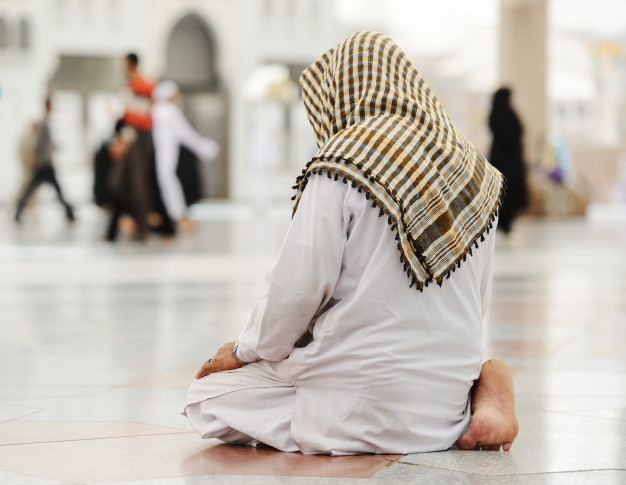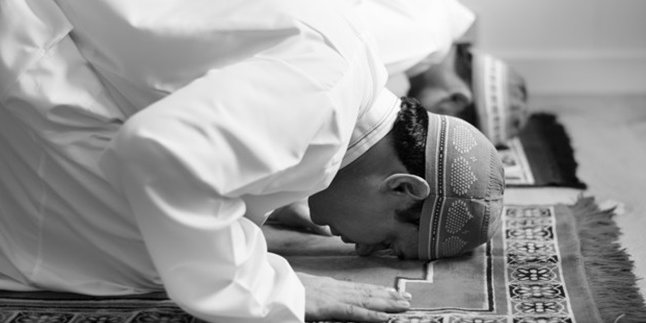Kapanlagi.com - For Muslims, performing the 5 daily prayers is a mandatory matter that must be carried out. The high position of prayer for Muslims is likened to the pillar of Islam. It is no wonder that many people strive to be devoted in worship to Allah SWT. But what does khusyuk mean in Islamic understanding?
To explain this, there are many meanings of khusyuk that we can learn. There are even many verses and hadiths that discuss khusyu in worship.
So, what is the meaning of khusyuk in Islamic understanding? According to various sources, this is the meaning of khusyuk in Islamic understanding. Let's check it out, KLovers.
1. Understanding Khusyuk

Illustration (credit: Freepik)
Khusyuk means tranquility and submission to God in performing worship, especially in prayer. The meaning of khusyuk in Arabic is al-inkhifaadh (humility), adz-dzull (submission), and as-sukuun (stillness). A person is said to have khusyuk-ed his/her eyes if he/she has lowered his/her gaze.
Terminologically, khusyuk is someone who performs prayer and feels the presence of Allah SWT very closely, so that his/her heart and soul feel calm and peaceful, not making any pointless movements and not looking around. According to scholars, khusyuk means softness of heart, tranquility of mind, and lowly submission caused by lust and a heart that weeps when in the presence of Allah SWT.
2. Types of Khushu'

Illustration (credit: Freepik)
In addition to understanding the meaning of khushu', you also need to know its types. There are several types of khushu' that you need to know, according to Imam Ibnul Qayyim there are 2 types of khushu', namely khushu' of faith and khushu' of hypocrisy.
Khushu' of faith is the submission of the heart to Allah SWT with an attitude of glorification, honoring, calmness, fear, and shame. The heart is open to Allah SWT with openness that is covered by humiliation due to worry, shame mixed with love.
Meanwhile, khushu' of hypocrisy is when it appears on the surface of the body in a forced and artificial manner, while the heart is not khushu'. Some companions said: "I seek refuge in Allah SWT from khushu' of hypocrisy. When asked what is khushu' of hypocrisy? He explained, "When the body appears khushu' while the heart is not."
3. Verses About Khushu'

Illustration (credit: Freepik)
Not only is the meaning of khushu mentioned 17 times in different forms in the Quran, but also some of the verses state that khushu applies to other things besides humans, such as mountains and the earth. Here are some verses about khushu in the Quran:
- Surah Al Baqarah verse 45
"And seek help through patience and prayer, and indeed, it is difficult except for the humbly submissive [to Allah]."
- Surah Ali Imran verse 199
"And indeed, among the People of the Book are those who believe in Allah and what was revealed to you and what was revealed to them, [being] humbly submissive to Allah. They do not exchange the verses of Allah for a small price. Those will have their reward with their Lord. Indeed, Allah is swift in account."
- Surah Al Isra verse 109
"And they fall upon their faces weeping, and it increases them in humility."
- Surah Al Anbiya verse 90
"So We responded to him and granted him John, and amended for him his wife. Indeed, they used to hasten to good deeds and supplicate Us in hope and fear, and they were to Us humbly submissive." And they are the ones who are devoted to Us."
4. Hadith About Khushu'

Illustration (credit: Freepik)
Not only about the verses of the Quran that discuss humility, but there are also hadiths that mention about humility. And here are some hadiths about humility:
- From Abu Hurairah, the Prophet Muhammad (pbuh) said, which means: "Seven groups of people will be shaded by Allah on a day when there is no shade except His shade; (and among them mentioned) a person who remembers Allah in solitude and his tears flow." (HR: Al-Bukhari, Muslim, and others)
- The Prophet Muhammad (pbuh) said, which means: "Whoever remembers Allah and then he cries until his tears flow and fall on the ground, he will not be punished on the Day of Judgment." (HR.Al-Hakim and he said the chain of narration is authentic)
- From Abu Hurairah, the Prophet Muhammad (pbuh) said, which means: "All eyes (of mankind) on the Day of Judgment will cry except (there are some people who do not cry) (first) the eye that refrains from what Allah has forbidden, (second) the eye that stays awake (at night) in the way of Allah, (third) the eye that cries out of fear of Allah even if (the tears that come out) are as small as the head of a fly." (HR: Ashbahany)
- From Bahaz Bin Hakim from his father from his grandfather, may Allah be pleased with them, his grandfather said, "I heard the Prophet Muhammad (pbuh) say, 'Hellfire is forbidden to burn three groups of people because of their eyes, (first) the eye that cries out of fear of Allah, (second) the eye that stays awake (stays up) in the way of Allah, (third) the eye that is preserved from what Allah has forbidden." (HR: At-Thabrani, Al-Baghawi, and others, Al-Hakim said this hadith is authentic and agreed upon by adh-Dhahabi)
- Narrated from Zaid bin Arqam that the Prophet (pbuh) prayed: "O Allah, I seek refuge in You from knowledge that is of no benefit, a heart that is not humble, a soul that is not satisfied, and a prayer that is not answered." (HR.Muslim no.2722)
- From Syaddad bin Aus, the Prophet Muhammad (pbuh) said: "Indeed, the first thing taken away from people is humility." (HR.Ath-Thabrani in Mu'jam al-Kabiir no. 7138, narrated marfu)
5. How to Perform Khushu' in Prayer

Illustration (credit: Freepik)
There are several ways to make our prayer more khushu'. Here are some ways to achieve khushu' in prayer:
- Follow the correct procedures
- Understand the prayer recitations
- Focus
- Clean environment
- Consider each prayer as the last one
6. Levels of Khushu'

Illustration (credit: Freepik)
Here are some things that a person will feel in terms of khushu':
- Trembling of the heart
- Goosebumps
- Tears
- Softness of the heart and skin
- Tranquility
- Humility
- Serenity (Thuma'ninah)
7. Meaning of Sholat
Until now, many people are still confused about which term is correct between sholat and salat.
According to the Great Indonesian Dictionary (KBBI), the word salat means the second pillar of Islam, in the form of worship to Allah SWT, which is mandatory for every accountable Muslim, with certain conditions, pillars, and readings, starting with takbir and ending with salam. In addition, salat can also be interpreted as a prayer to Allah SWT.
The KBBI also explains that the word salat itself is a standard term in Indonesian. Meanwhile, informally, the word salat has several variations, such as sholat, shalat, and even solat. However, the use of the word sholat that is not in accordance with the correct spelling does not necessarily need to be blamed.
Because in terms of meaning, both standard and informal variations of the word have the same meaning and significance, which is a worship in Islam. Moreover, the essence of this worship is actually obedience and khushu'. Not in the correct pronunciation or spelling.
8. The Virtue of Praying with Khushu

(credit: unsplash)
As explained in the above discussion on the meaning of the word prayer, the virtue of this worship lies in the obedience and devotion in performing it. Even in the Quran and Hadith, it is mentioned that prayer performed with devotion will bring many benefits.
Here are some virtues or benefits of prayer performed with devotion.
1. Prayer performed with devotion will bring happiness (fortune) in this world and the hereafter. Allah SWT explained this through one of His verses which says:
"Indeed successful are the believers, (who are) humble in their prayers." (QS Al Muminun verse 1-2).
2. Prayer performed with devotion can also provide peace in the heart. It is proven that a person who prays with devotion does not feel anxious when faced with adversity or life's trials. This is as stated in:
"Indeed, mankind was created prone to complain." When adversity touches him, he is ever complaining; But when good comes to him, he is ever niggardly. Except for those who are devoted to prayer, Those who remain steadfast in their prayer." (QS Al Ma'arij verse 19-23).
3. Prayer performed with devotion can also erase past minor sins. This is as explained by the Prophet Muhammad SAW in one of his hadiths which says:
"Whoever performs two rak'ahs of prayer in which he does not speak any worldly affairs, his past sins will be forgiven." (HR Ibn Abi Sya'ban).
That is the meaning of devotion in the Islamic understanding. Also, the explanation of the word prayer means the same as sholat, shalat, or salat. Hopefully, by understanding the meaning of devotion, you will be closer to Allah SWT in every worship.
(kpl/gen/dhm)
Disclaimer: This translation from Bahasa Indonesia to English has been generated by Artificial Intelligence.



















